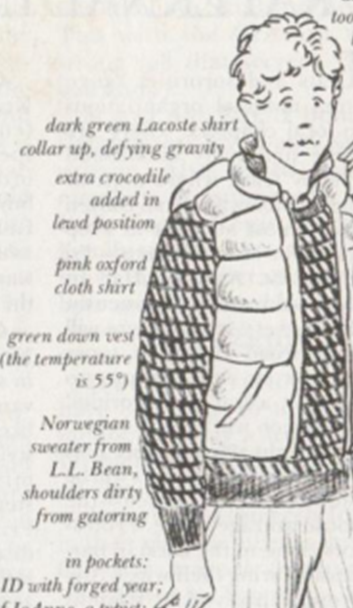Now that he’s been convicted of criminal contempt of Congress and may (again) be facing jail time, the repulsive Steve Bannon is back in the news.
Of all the orcs who dance attendance on their bloated master,
Bannon may be the most physically disgusting. With his greasy, shaggy hair, bloodshot,
baggy eyes, porcine jowls, pocked and raddled hide which alternately flushes
and pales in a manner indicative of significant cardiac issues, and a physique
of about the same shape and consistency as a rotten watermelon, you just can’t
help but wonder if the evil in his soul hasn’t corrupted the rest of him. It’s
not often that I agree with #FatDonnyPeaches, but when he called Bannon “Sloppy
Steve” during one of their little tiffs, I found myself hard-pressed to
contradict him.
 |
| Does this make any sense to you? Keep reading. It will. |
Considering what all those layers must do on a hot day to a guy with a sagging, flabby build and, if appearance is anything to go by, questionable personal hygiene, such a getup understandably mystifies people.
“Steve
Bannon’s Penchant for Wearing Several Shirts at Once Confuses People Across the
Political Spectrum,” reads a 2022 headline from Distractify.
“Why does
Steve Bannon wear all his shirts at once?” wonders Morwenna Ferrier in The
Guardian, quoting Joshua Green, Bannon’s biographer, who says, “I’ve never been
able to figure it out. I don’t have any idea. It’s the weirdest sartorial style I
have ever encountered.”
Karen Fratti at Hello Giggles indulges in a little journalistic
bait and switch with the teasing headline “We finally
know why Steve Bannon always wears so many shirts,” but
then fails to deliver, when she concludes, “So we don’t really know precisely
why Bannon wears multiple shirts… America may never know.”
Even the venerable GQ, which really ought to know better, fumbled
the ball in a piece entitled, “Steve
Bannon Doesn’t Understand Layering,” the tone of which hovered somewhere
between bewildered and condemnatory.
Olivia Nuzzi at The Cut gets a little closer with her article “Here’s Why
Steve Bannon Wears So Many Shirts” wherein she quotes friends of his
who claim that he picked up the habit at Benedictine College Preparatory, the
Catholic military institute he attended as a teenager. But, as someone who went there pointed out, students wear the kind of army-guy cosplay
uniforms that such schools require (and those don’t come with multiple shirts),
and added, “I don’t know what the uniform was exactly when Mr. Bannon was
here,” but “there’s not multiple shirts.”
But we’re getting there, and the answer is far more interesting than it may
seem at first glance. What began as a “What the actual fuck, Hog Steve? Forget
to take off yesterday’s clothes before you put today’s on?” gives way to a
question that that sheds significant light on the mind of Steve Bannon. Which,
considering he got us into the mess we’re in now, is an important question.
The semiotics of clothing is a woefully underutilized analytic tool, and I
don’t understand why pundits and commentators don’t use it more. What people
wear tells you an awful lot about them. Frequently more than they’d like
you to know. They tell us not only about a person’s background, but what the
wearer WANTS us to think about his background.
§§§
I read these articles with a chuckle because I knew immediately what he was up to, as would
anyone who, like me,
1) Grew up in the 80’s, and
2) Went to a college where the pretensions of its students far outweighed the school’s actual prestige.
This last is a crucial piece of the puzzle, and bears a little
explication.
I went to a small, private, liberal arts Christian college in
Indiana called Taylor University. This was, out of a strong field of
contenders, the biggest mistake I ever made, but that’s a topic for another
blog post.
As a Christian college, Taylor by definition lacked the prestige
of secular schools of similar size and vintage (1846) like a Bates (1855), an Amherst (1821) or a
Swarthmore (1864). It didn’t even have the prestige of a Midwestern liberal arts
college like a DePauw or a Denison.
Nonetheless, it had a bit of cachet in the evangelical world, and had among its students a certain group of kids—largely from the east coast, but with a smattering from places like Cleveland, Chicago and Detroit—from wealthy families high up in the food chain of the Christian world. These kids all seemed to know each other from having gone to the same Christian prep schools and Christian summer camps. Many of their parents sat on the boards of the same Christian institutions.
At Taylor, they formed an elite clique which attracted second-tier hangers-on (like me): kids whose families
were not part of this wealthy Christian network, but who were mesmerized by their tales of boarding school, summers spent sailing on the Atlantic and visiting each other's summer houses, and their general aura of privilege, superiority and connectedness.
There was another reason I gravitated toward them: I knew Taylor was no great
shakes. It chewed at me. But hanging around these kids let me pretend Taylor
was a lot more prestigious than it was (part of the “Ivy League of Christian schools,”
as another hanger-on like me called it). I aped their attitudes, their mannerisms and their look, which, for lack of a better word, we’ll call “preppy.”
I had no idea what I was doing. My background was nothing like
theirs (St. Louis Jewish on my mother’s side, Indiana farmers on my father's).
Like any tyro, I made a mortifying hash of it, and suffered my share of deserved ridicule. I needed an instruction
manual. Luckily, I found one at the public library. It was Lisa Birnbach’s “The
Official Preppy Handbook.”
The Handbook had been out for about nine years by the time I found
it and it was, ostensibly, a work of satire mocking the foibles and
lifestyles of America’s old-money elites. But the book’s almost sociological
precision tells a different story. Birnbach might claim to mock her subject, but
it’s pretty obvious that she wanted to be part of it, and so did I.
We weren’t alone. The book’s impact in the 80’s was enormous. It exposed, in anthropological
detail, a world that most middle-class Americans had vaguely intimated from
having seen the Kennedys or having read “A Separate Peace” or “Love Story”, but
never really known anything about. The Handbook revealed a world
of inherited wealth and prestige, privilege, and luxury. In a money-obsessed
decade, it wasn’t satirical, it was aspirational. Those who read it wanted to be a part of it. God knows I did.
Well, tough luck. Pedigree is fundamental to prepdom, and you
can’t fake that. You’re either born to a long line of loaded blueblooded
Episcopalians with tons of cash or you aren’t. But there WAS a consolation
prize: the Handbook showed you could dress like it.
And doing so was easier and cheaper than you might have thought.
One of the defining characteristics of this class is its abhorrence of
ostentation, which means the clothes really aren’t all that expensive. They’re
good quality, but brands like Orvis, Pendleton, Gant, L.L. Bean, J. Press, and
Brooks Brothers—and plagiarists like Lands End, Ralph Lauren, J. Crew and
Vineyard Vines—won’t break the bank.
Anyone who pored over the Handbook would instantaneously know where
Bannon’s shirt over shirt over shirt look came from:
This is what Bannon's up to--appropriating the look so that people think he's the old-money, elite, Establishment.
But he doesn’t quite pull it off. He fails (spectacularly) in two ways:
1. He doesn’t get the attitude.
After years of mulling this over, I think I’ve figured out what the real key to dressing like a genuine prep is. It’s not the careful assemblage of elements. It’s insouciance.
"Trying too hard" is the antithesis of the prep ethos. Real preps just don’t give a
fuck about projecting an image. They don’t need to. They have nothing
to prove. There’s no
intentionality. They simply wake up from a hangover in their dorm room at
Dartmouth or Brown or Vanderbilt or wherever with five minutes to get to class
and they throw on whatever’s near to hand. If it’s cold, they’ll throw on a couple
of shirts, maybe a jacket that they found wadded up under the bed and they’ll
dash out rumpled, unmatched, uncombed and untucked.
And they’ll look fabulous doing it. Because it’s not really about
what you wear, it’s how you wear it. If you wear it with confidence, then
you’ll look terrific in whatever you’ve got on.
As the great menswear writer G. Bruce Boyer said of George H.W.
Bush, who was the real McCoy (Greenwich Country Day, Phillips Academy, Yale), “He has that Old Money Look and will wear
boat shoes and checks with plaids in that kind of nonchalant way that says
“screw you.”
And as Boyer said of someone who doesn’t
pull it off (Tucker Carlson), “I look at him and say it may be natural for him,
but it doesn’t look natural. It looks like he’s trying too hard, but I
can’t quite put my finger on why.”
In other words, even with all the
right ingredients, if you don’t have the right attitude, it’ll show.
2. 2. He doesn’t know when to do it.
Real preps know when to grow up. By the time they reach adulthood, they know damn well not to dress from the dorm room floor. They, like the rest of us, put on suits and ties and go to work, leaving the shirt over shirt (over shirt over shirt) look back at college. Look at the real preps: William Barr (Horace Mann, Columbia, George Washington Law School) and John Bolton (McDonogh School, Yale, Yale Law).
Barring certain unprep elements of
their backgrounds (Barr’s father was Jewish and Bolton’s was a fireman), they
both have pretty unimpeachable prep credentials, and it shows in how they
dress. Unless you’re looking, you’d never notice (which is precisely what real preps want), but there are subtle, yet undeniable tells: the roll of the collar, the width and
knot of tie and lapels, the tie patterns (repp or small repeating images),
the cut of the suit, the shape of the shoe’s toe.
Unlike the rest of the Trump coterie, they never
started dressing like #FatDonnyPeaches. Look at how Kevin McCarthy's and Mike Pence's outfits changed over the four miserable years of his regime. But Barr and Bolton stuck to the same
rumpled Brooks Brothers button-downs, boxy J. Press suits, and round horn- or
wire-rimmed glasses they’ve worn since the 80’s.
(Such sartorial independence
indicates a certain independence of mind. Barr and Bolton’s loyalties were
never to #FatDonnyPeaches himself, but rather to their convictions. They’re
ghastly convictions, but at least they have them. This is borne out by their
conduct. Bolton left in disgust and wrote a tell-all book, and Barr, in the
absence of any evidence of “widespread voter fraud,” informed his boss that DOJ
wasn’t going to pursue the matter and quit.)
In essence, they echo the lie he sold to half the nation—that a cheap and tacky real estate developer was a true titan of industry, that a thrice-divorced perpetual adulterer was a paragon of Christian morality, and that a known crook was the proper repository of the nation’s trust.
If only we’d known what all those shirts meant.







